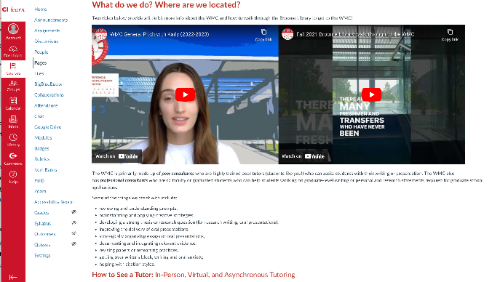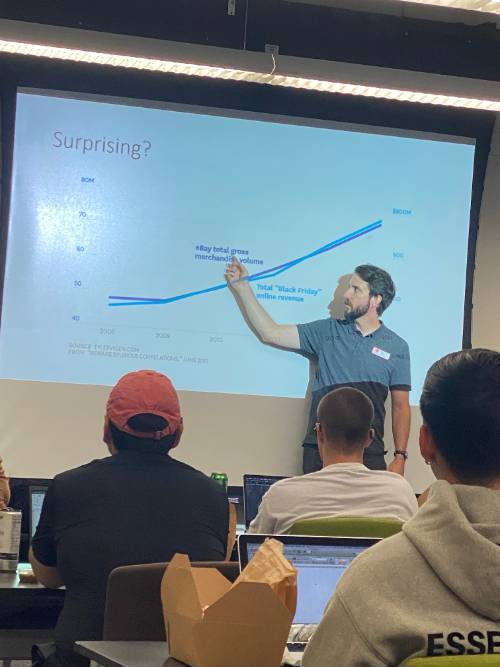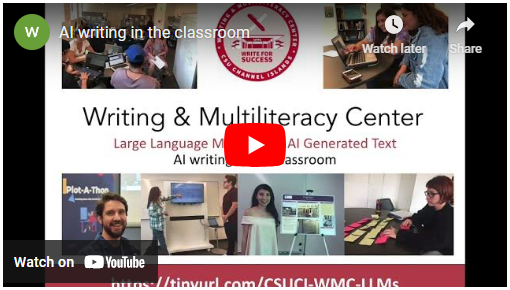The Center serves more than students. We serve CI faculty.
While the Writing and Multiliteracy Center provides writing and communication consultations for students and staff, we also support faculty by providing:
- Faculty consultations to support course assignment design, curricula design as it relates to helping students improve writing, communicating, or visualizing information and arguments. WMC faculty consultations can also to support faculty with professional presentations and academic articles. For consultations please email Faculty Director, Dr. Sohui Lee.
- Workshops both in person and on demand to fit the needs of the course and instructor (we provide over 40 workshops ranging in writing and multiliteracy topics);
- General WMC Module for your course canvas: provide easy access to recorded tutor pitches, WMC hours,
links to making appointments, and more!

- Multimedia Studio - use it as a communication "maker space" for your students to reserve to produce podcasts, record oral presentations, and get creative by using the green screen;
- Co-Curricular Events like Plot-A-Thon Data Visualization Festival, Writing Boot Camps, and WMC Open Mics that help your students build confidence in data literacy, writing, and communicating;
- Tips for how to encourage students to come to the WMC; and
- Online and print resources for writing and communication.
For faculty teaching writing intensive courses:
- First-Year Embedded Multiliteracy Tutors (FY-EMTs): WMC embedded tutors for lower-division writing intensive and/or communication intensive courses;
- EMT Mini Grant: faculty can apply for mini-grants to improve how they embed a tutor ($1000 upon completion). Please refer to the EMT Mini Grant link below.
For faculty teaching writing-intensive and/or communication-intensive courses; STEM courses:
- Embedded Multiliteracy Tutors (EMTs): WMC embedded tutors for upper-division writing intensive and/or communication intensive courses;
- STEM Writing Initiative Mini-Grant, writing consultations, and customized workshops with the STEM WI Activity Lead ($1000 for the Mini Grant, upon completion of a project, ends AY 2025)
For faculty interested in embedding a EMT for the first time or in a new course:
- Embedded Multiliteracy Tutor Mini Grant($1000): Mini grant is open to all faculty across all disciplines. It allows for faculty to consider how to most effectively integrate a tutor into a specific course which involves writing and/or communication intensive assignments. Examples might be first-year writing courses or GWAR courses, but WMC will consider any course that is writing/communication intensive.
Consultations and Custom Workshops for Faculty
 Faculty consultations help instructors and professors identify challenges and problems
students face when working on written, oral, or visual/multimedia assignments or activities
in a course. Consultations aim to provide concrete strategies or share tools and material
for improving students' learning experience. Topics may include rubrics for evaluating
writing or oral presentations, timing assignments, providing guidelines for peer review,
recording oral presentations, scaffolding assignments, using techniques for effective
commenting and feedback, reviewing syllabi or designing writing and communication
assignments, teaching creative thinking, exploring in-class composition activities,
and more.
Faculty consultations help instructors and professors identify challenges and problems
students face when working on written, oral, or visual/multimedia assignments or activities
in a course. Consultations aim to provide concrete strategies or share tools and material
for improving students' learning experience. Topics may include rubrics for evaluating
writing or oral presentations, timing assignments, providing guidelines for peer review,
recording oral presentations, scaffolding assignments, using techniques for effective
commenting and feedback, reviewing syllabi or designing writing and communication
assignments, teaching creative thinking, exploring in-class composition activities,
and more.
Custom consultations/workshops are designed to support faculty who want to provide student support for specific writing or communication assignments. For instance, WMC worked with faculty to create public health brief for a health science course and qualitative assessment reports for a sociology capstone. To make an appointment for a faculty consultation or workshop, please email Dr. Sohui Lee (sohui.lee@csuci.edu).
5-min Pitches and Workshops for Faculty
![]()
The Center provides pitches of the Center's services. We also provide writing workshops and multiliteracy workshops led by peer writing tutors, Multiliteracy Specialists, and the Faculty Director. Please visit our workshop page for details and to request a workshop for your class.
Four Ways to Encourage Students to Visit Us
Students are more likely to use our consultations services when instructors and professors encourage them. Here are four easy tips for how faculty can encourage students to visit the Center.
You can also show students our short video (1m24s) about the Writing & Multiliteracy Center. The video relates where we are, what type of tutoring services we provide, how to make appointments, and hours.
Embedded Multiliteracy Tutors
Embedded Multiliteracy Tutors (EMTs) are WMC tutors who are assigned to work closely with students in a specified course (usually upper-division, writing intensive and/or communication intensive course. For more information, please visit our EMT page for details.
ChatGPT and Generative AI Writing in the Classroom

ChatGPT and Generative AI in WMC tutoring sessions:
1. ChatGPT or other generative AI will only be used in tutoring session at student's
request
2. If AI requested, tutors will ask if student can share course policy or syllabus
statement on AI
3. If AI requested, tutors will inform student that a Tutorial Visit Form will be
sent to faculty
4. If AI used in tutoring session, the Tutorial Visit Form will detail how AI was
used in the session
Online Resources
![]()
We curate writing and communication resources that might faculty apply writing and communication activities and assignments for learning as well as work with students who are producing these assignments. Rescues include links for student writing at CI, writing across the curriculum, how to provide effective conferences with students about writing, and avoiding plagiarism. Learn more about online resources.
